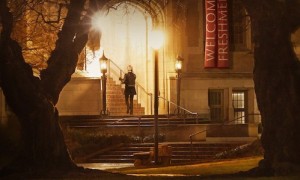 The Hunting Ground, the latest film from Kirby Dick and Amy Ziering (The Invisible War), vividly demonstrates the power of well-told stories to effect change. At a private screening in Washington, D.C just before its opening on Feb. 27, Sen. Kirsten Gillibrand (D-NY) discussed legislation to address the issues it raises about rape on campus.
The Hunting Ground, the latest film from Kirby Dick and Amy Ziering (The Invisible War), vividly demonstrates the power of well-told stories to effect change. At a private screening in Washington, D.C just before its opening on Feb. 27, Sen. Kirsten Gillibrand (D-NY) discussed legislation to address the issues it raises about rape on campus.
Through interviews with women and men from campuses private, public and religious; old and ivied and mall-like regional; and from cozily small to anonymously big, The Hunting Ground shows the prevalence of rape and its long-term consequences of PTSD and disrupted lives.
Through expert interviews and statistics, the filmmakers reinforce the lessons of the survivors’ stories. This isn’t about alcohol, or education, or poor judgment, they say. It’s about a small number of repeat-offender bad actors on campus, rapists who know that they can act again and again with impunity. Some of them are college sports figures, permitted to get away with it to protect the big business of sports. But colleges also wave away rape charges generally, for fear of driving up crime statistics, entangling themselves in criminal processes, and generally scaring the students/parents/donors. The excuse of “he said, she said,” is also debunked. The rates for false reporting of rape are no higher than for other crimes.
Through the story of two intrepid rape survivors from University of North Caroline, Chapel Hill, the film points to a way out: Title IX anti-discrimination lawsuits against colleges by the survivors.
As with Kirby Dick’s earlier work, the stern, driving pace and tone of the film brings the viewer along into not only revelations but judgment. The officials who coddle the rapists and let the survivors flounder are held in contempt. At its Sundance Film Festival premiere, it won its first standing ovation, which Ziering says has happened at every screening since. It is a polemic, to use the term journalist Emily Yoffe used; her detailed research provides the nuance (ambiguous cases, including some in the film; what some schools have done right) that “The Hunting Ground” eschews.
At the screening, Dick and Ziering described their goal with the film. “The first step is changing awareness,” Dick said. Ziering explained, “It’s putting a face on the story but it’s more than that, it’s putting a different frame around what people think they know.”
The goal of raising awareness is sometimes regarded as too general in an era of big data, endless buzz about metrics, and elaborate engagement plans. But, as Kirby Dick noted in anIndiewire interview, “One of the things a good film can do is change the way a person sees an issue for the rest of their lives.”
The production team did have a remarkable advantage as they launched the film: a solid relationship with Sen. Kirsten Gillibrand, who had previously proposed legislation related to the issues the team had raised about sexual predation in the military in The Invisible War. She hasproposed legislation with a number of cosponsors and bipartisan support, to provide higher education institutions with an incentive to address the issue, with requirements to report, establish penalties, and uniform disciplinary processes.
“It’s not always as easy as they make it seem to make an impact of this kind,” privately noted one public official at the screening. Indeed, as a recent guide spells out, it’s something of an art to weave a social-issue film’s concerns through the thicket of political pressures, and even get a screening, much less a bill.
But it certainly is a great way to launch a theatrical run.
